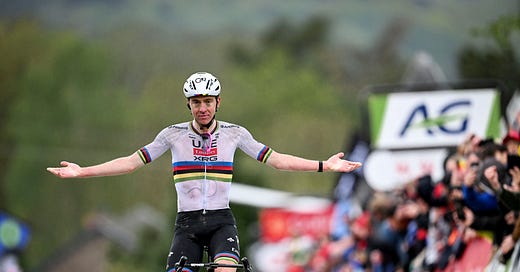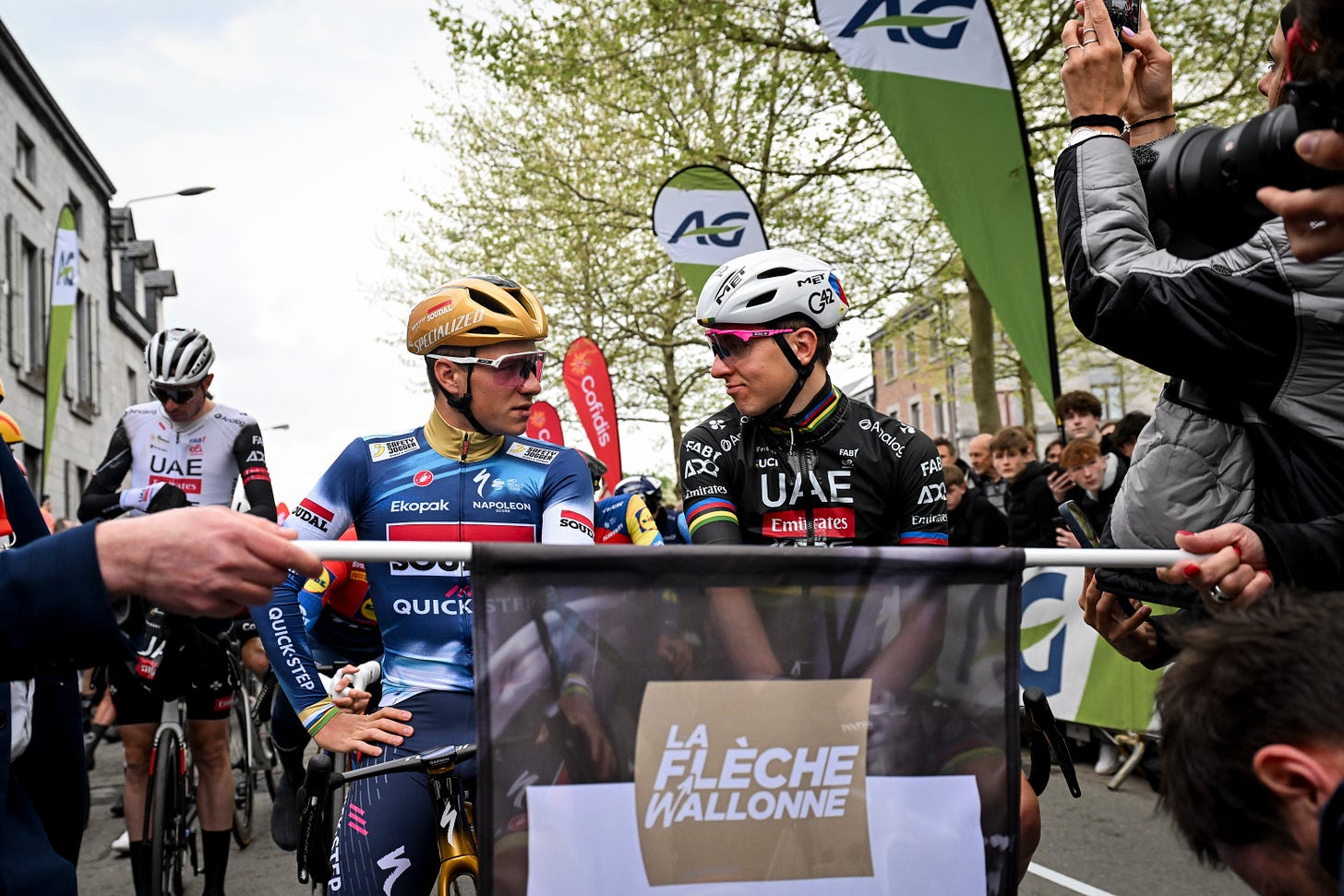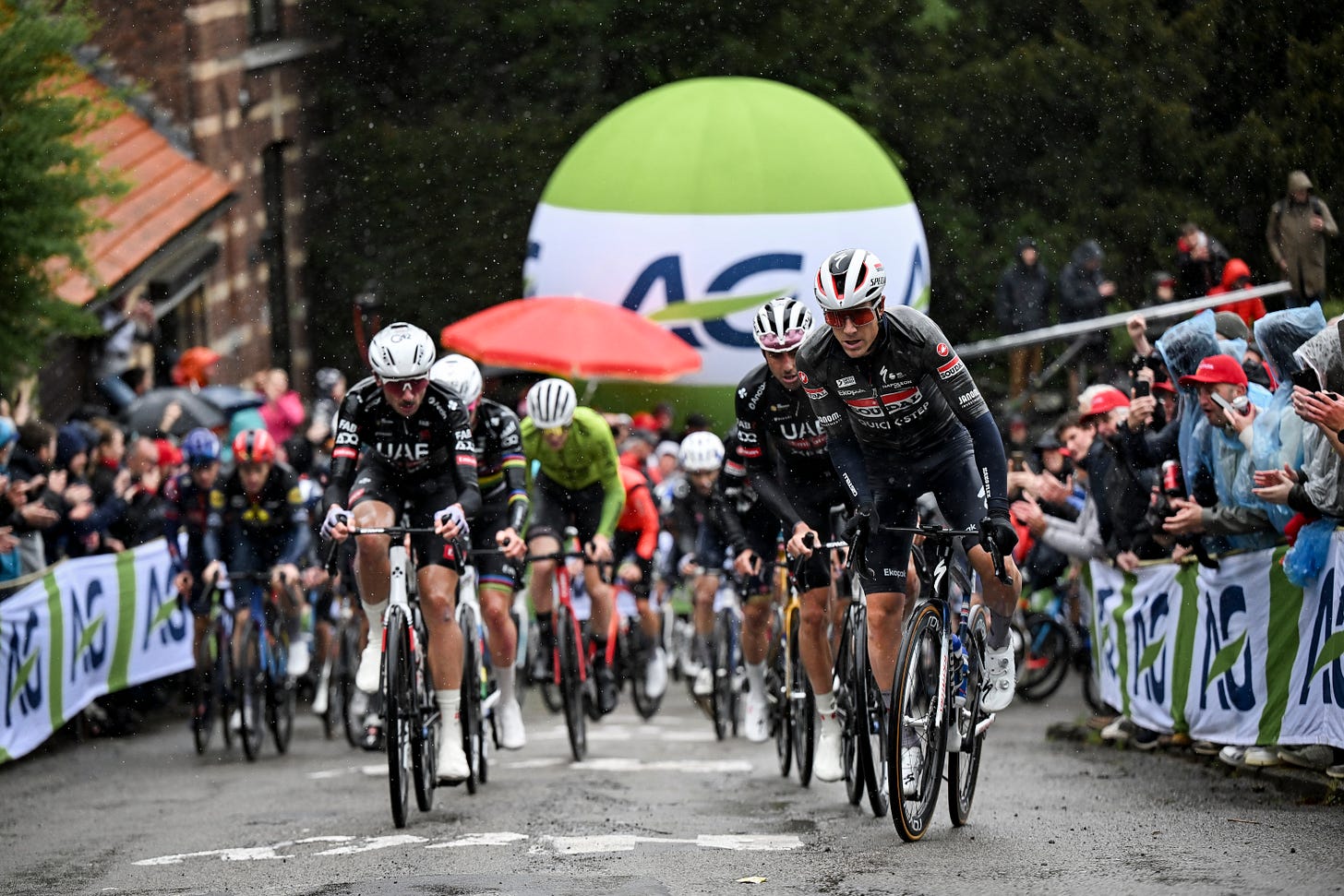The heir to 'El Bala'
Pogačar storms to second Flèche Wallonne victory | From Maastricht to Bastogne, Pogačar and Evenepoel are finally delivering the Ardennes showdown we've long been waiting for.
I’m not here to discover Pogačar’s versatility. His ability to excel across terrains, profiles and surfaces has long been proved, but what truly sets him apart right now is the rare blend of explosiveness, climbing ability and an unmatched capacity to generate watts on gradients above 10%.
It’s this cocktail that makes the Slovenian perfectly suited to dominate a race like the Flèche Wallonne, the unofficial world championship of goat-track climbs.
While he’s a once-in-a-generation rider with a legitimate claim to the throne of the greatest cyclist of all time, fate has placed him in an era full of giants: Van der Poel, arguably the finest one-day racer of all time; Evenepoel, the world’s top pure rouleur, among other talents; and Vingegaard, the greatest pure climber of the 21st century. Every win, then, is a distillation of merit and epic flair. And yet, his rivals manage to humanise him. He doesn’t lose very often, but he does lose.
At Flèche, he’s proven what Alaphilippe and Roglič only hinted at but never quite confirmed: he can be Valverde’s true successor in this race (5x winner). He’s still got room to do it.
Here are my takeaways from Flèche Wallonne and what they could mean for Liège:
A chess game that began on Amstel
The clash between two such exceptional, aggressive, impulsive and winning talents as Pogačar and Evenepoel promises a spectacle and, for the first time in decades, gave us a glimpse that Flèche might be more than just an uphill sprint at the Mur de Huy.
The reality is that the tactical battle between them, much like what happened at Amstel with a special guest like Skjelmose, seemed more fitting for Milan's defence in the 90s than an Ardennes classic.
Logic suggested that Pogačar wouldn’t need a long-range attack, as he often does, but not just to conserve energy: he knows that if Remco is in the race, any advantage in the final section can quickly evaporate.
For Evenepoel, however, a finish this explosive, with ramps reaching almost 20%, didn’t seem ideal against Pogačar. Quick-Step worked, we waited for the attack... but it never came. The race unfolded exactly as UAE wanted, and only in the last 5 kilometres did we see a small move after the Côte de Cherave. Pogačar launched himself on the descent, despite being surrounded by McNulty and Christen, with Remco sticking close to him. As soon as he could, just seconds later, he showed his wheel and took charge of the descent. Why did Pogačar make that move?
A chess game where the Mur ended up feeling like a checkmate in two moves.
A tough day
Perhaps Evenepoel's strategy was affected by the crash and abandonment of Van Wilder. In the same corner, Mattias Skjelmose, winner of Amstel, went down, left the race and who knows if he also lost his chances of being in Liège on Sunday.
A misfortune on a very rainy and cold day. One of the riders who showed the worst feelings due to the weather was Thibau Nys, one of the sensations of the moment and a contender for the podium in his first participation in FW. The cold forced him to seek shelter about 60 km from the finish... and without teammates, he had to make an unnecessary effort to get back to the group.
The commissaires seemed to issue a barrage and Nys learned a valuable lesson: never give away a gram of energy, especially when you're racing against Pogacar and Evenepoel on garage-like ramps. He finished 8th.
Death, taxes and Pogi
The race left us with unusual images for what is typically Flèche Wallonne.
The breakaway of the Norwegians Dversnes, Leknessund and Foss, great all-rounders, went much further than is usual in FW. They were caught about 7 km from the finish, though they were never a real threat. Remco promised a hard race, one that would be long enough to "kill the legs" of his rivals, but the toughness came from the weather conditions. Pogačar only needed to unleash his watts on the final climb to Huy and gifted us with a 'long-range attack', from about 500 metres to the finish. As far as a long-range attack can go here, until someone decides to break the script, as happened in Sanremo this year.
He attacked seated, went away with the same ease he showed against Alaphilippe in Amstel, and opened a huge gap in two corners. His victory was crushing, and the biggest margin in FW since Igor Astarloa's win in 2003. Too easy.
It’s a moral boost after his defeat in Amstel, perhaps not as hard as the one in Sanremo or as significant as the one in Roubaix, but definitely the most unexpected and the one that raises the most doubts about his fatigue, especially when the race goes over 200 km. Flèche is a great classic, it’s been a statement of authority... but Liège is another story.
Evenepoel, a rider given to epic moments, riding solo and made for up-and-down races, couldn’t get close to the podium on the final climb (9th). Unlike Pogačar, his inactivity allows him to tackle the full trio of races without doubt on his performance on Sunday.
Other stories from Flèche
Kevin Vauquelin finished 2nd again at FW. He was emotional at the end of the race, but the reality is that his performance is not a surprise. He left an excellent impression and was one of the few still with Pogačar and Evenepoel 5km from the finish, when the group split into pieces.
He crossed the line with a significant gap over Pidcock, who completed the podium. His performance boosts his value even further. Arkéa is a project on the brink of collapse, needing between 20 and 25 million euros to survive, and their relegation is almost certain, despite Vauquelin's performances. The Frenchman, whose contract is ending, is in high demand. As Daniel Benson reported, INEOS is after him.
Flèche left me with other names, like Jan Christen, who put in a superb performance by accelerating the pace of the small group before the climb to the Mur, but also some absences: Hirschi, Mas and Stevie Williams, last year's winner, were largely unnoticed, as was Julian Alaphilippe. Mas, who is not particularly fond of the classics and struggles in bad weather, is a more understandable case. For the other three, with various nuances, there are reasons for concern.
Pogačar claimed his fifth win in the Ardennes, and if he wins on Saturday, he will equal Gilbert in fourth place historically there. The list is led by Merckx (surprise) with 10 and Valverde with 9 wins. A record within reach.
Although the triplet, a feat only achieved by Gilbert and Rebellin, was beyond him after his second place in Amstel, Pogačar's decision seems to be a mix of pride, leadership, stubbornness… and also a historical perspective. There are fewer than ten riders with the Flèche-Liège double in the same week and only a few have stood on the podium in all three in the same season.
Wins in RVV, Strade Bianche, Flèche Wallonne and podiums in Sanremo, Roubaix, and Amstel. The paradox of greatness means that, despite this being one of the greatest spring seasons in cycling history, if he doesn't win in Liège it will feel bittersweet. This is what great challenges entail.
Remember, you can follow Cycling Report on Twitter, Instagram, or Bluesky, as well as on my personal account.
The best way to support the project is to share the content if you enjoyed it.
Don't forget to subscribe!







